Hispanic Heritage Month at Physical Sciences

It’s Hispanic Heritage Month, which means from now until October 15th, we’ll be shining lights on the Hispanic and Latinx members of the School of Physical Sciences community, who themselves cast new light onto the many-varied fields they study. They’re casting light on the Amazon rainforest, where they’re trying to characterize the different types of wildfire that spread through the rainforest, and where they’re trying to understand how, if enough trees die in the rainforest due to climate change-driven droughts, the rainforest’s ecosystems will collapse. And beyond this planet, they’re studying why some galaxies stop creating new stars, and they’re working to measure the distribution of metals in those galaxies. Whether Earth-bound or star-bound, or whether they work behind the scenes making sure the rest of the Physical Sciences community hears their stories, our Hispanic and Latinx scientists and staff make our School hum.
Audrey Odwuor, Ph.D. student, Department of Earth System Science
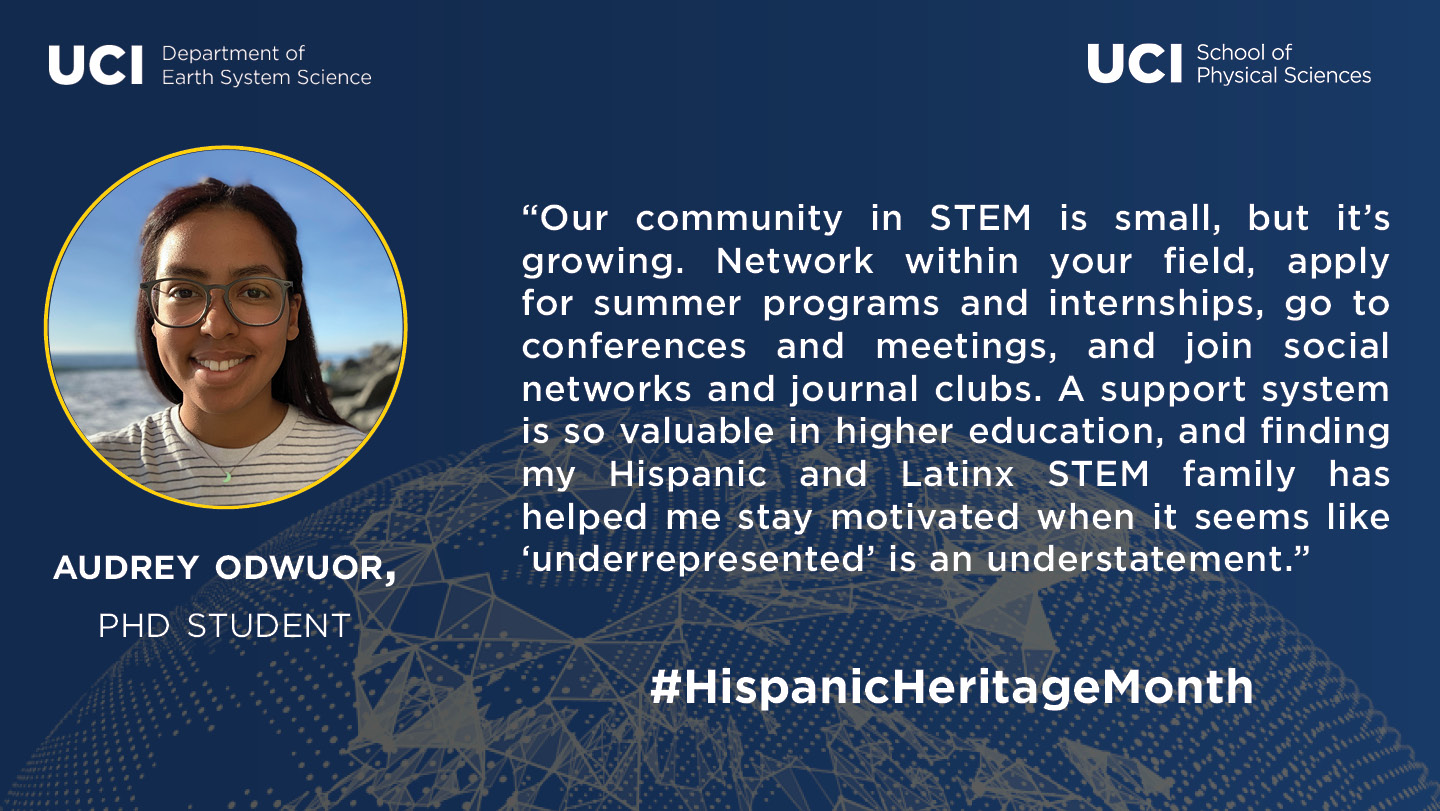
PS: Tell us about yourself and your research.
AO: My name is Audrey Odwuor and I’m a second-generation Mexican-American. I’m beginning my third year as a Ph.D. student in the Department of Earth System Science studying fire as a driver of global change. In my work, I use aerosol samples from Brazil, satellite observations of fire, and modeled data to understand how much of the recent increase in fire activity in the Brazilian Amazon is due to deforestation versus other types of fires.
PS: What advice do you have for hispanic students who are considering a career in STEM?
AO: My advice to Hispanic students pursuing STEM: Don’t be discouraged if you’re the first one in your family to get a degree, the only Hispanic student in your department, or if you don’t have any Hispanic faculty or if none of the papers you cite seem to be by Hispanic researchers; our community in STEM is small, but it’s growing. Network within your field, apply for summer programs and internships, go to conferences and meetings and join social networks and journal clubs. A support system is so valuable in higher education, and finding my Hispanic and Latinx STEM family has helped me stay motivated when it seems like “underrepresented” is an understatement.
Paulo Brando, Assistant Professor, Department of Earth System Science
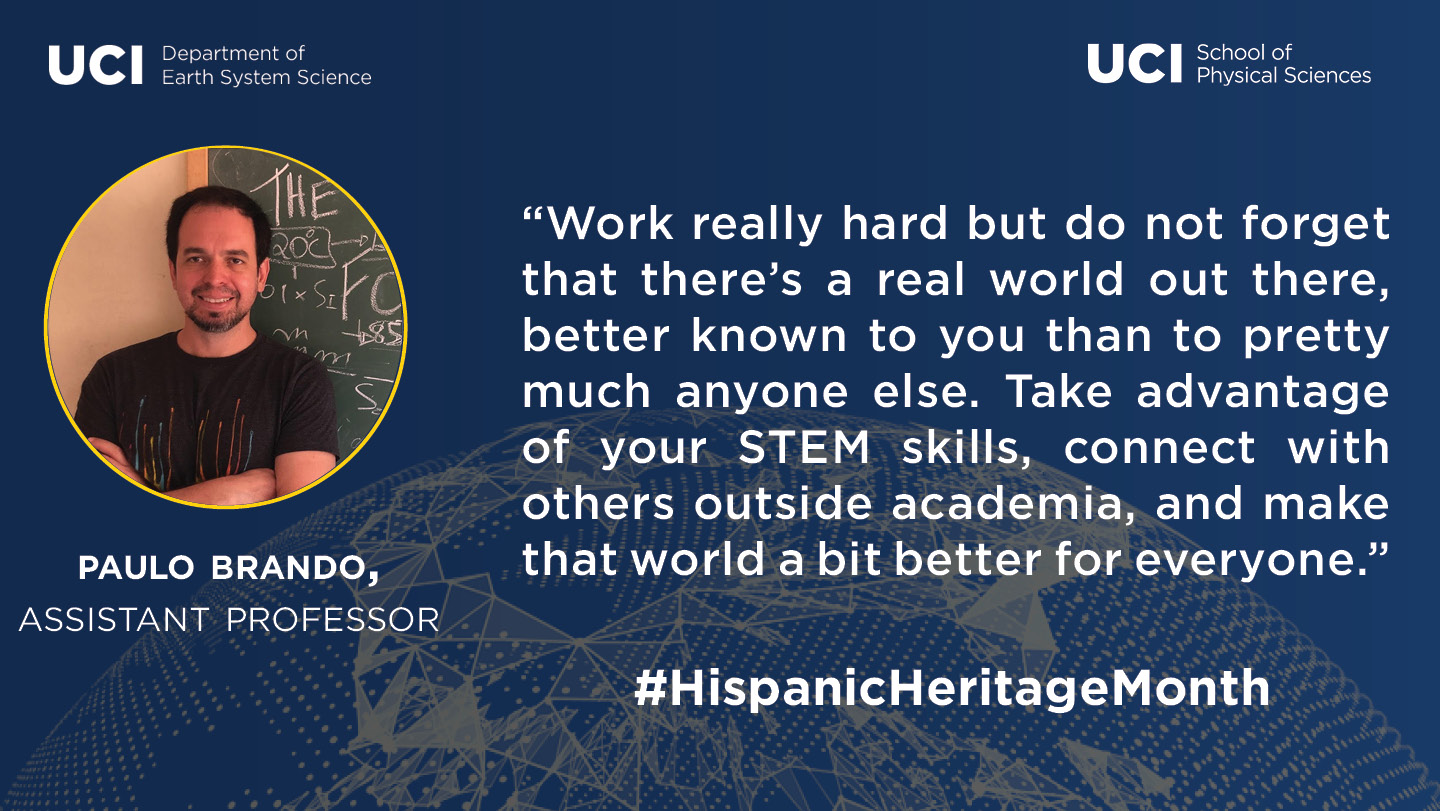
PS: Tell us about yourself and your research.
PB: I've always been fascinated by our natural world and astonished by how fast it’s changing. I think this has to do with how I grew up, always hearing stories about the Amazon and its peoples. This motivated me to study forestry, ecology and statistics. I have now a more unbiased and realistic view of the issues threatening forests — and some of the solutions at hand. But the boundary of my subjectivity remains quite solid. I still consider forest conservation to be key to our future on this planet.
PS: What advice do you have for hispanic students who are considering a career in STEM?
PB: Work really hard but do not forget that there’s a real world out there, better known to you than to pretty much anyone else. Take advantage of your STEM skills, connect with others outside academia, and make that world a bit better for everyone.
Cindy Yañez, Ph.D. student, Department of Earth System Science
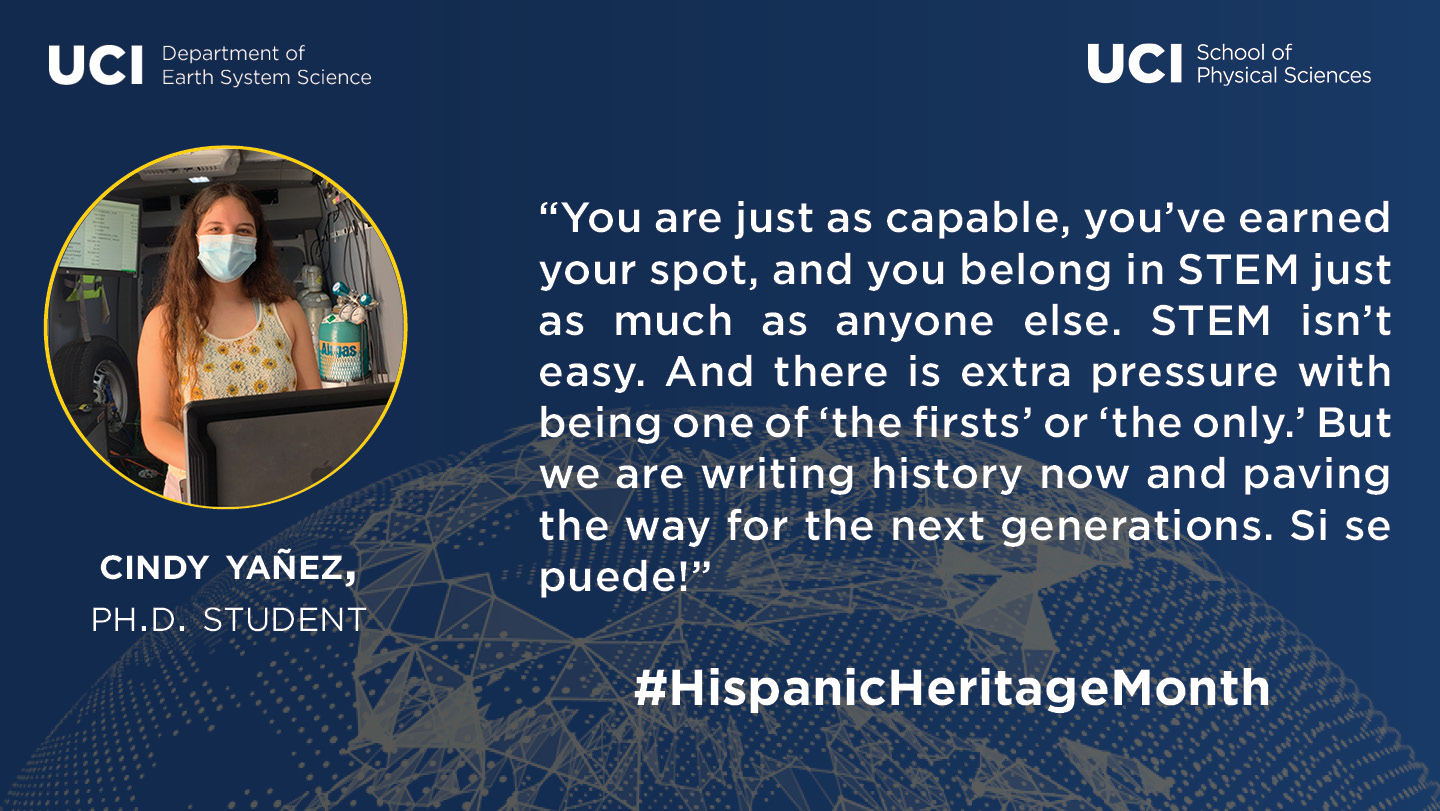
PS: Tell us about yourself and your research.
CY: My name is Cindy Yañez. I’m a second year in ESS with the Czimczik lab and am a second-generation Mexican-American. My research involves analyzing spatial patterns of fossil fuel CO2 emissions in California and how they were affected by the COVID-19 pandemic. I use a mobile laboratory to measure greenhouse gases on the road, and the isotopic signatures of annual grasses to determine the fossil fuel contribution of CO2 in urban air. My goal is to compare these measurements with satellite measurements from OCO-2 and OCO-3, in order to see if annual grasses can be a cost-effective bio-monitor for pollution and fossil fuel emissions.
PS: What advice do you have for hispanic students who are considering a career in STEM?
CY: A career in STEM can be incredibly exciting and rewarding. However, there may be times when you feel totally out of place as an Hispanic or Latinx student. It’s really important to build confidence in yourself and your work. You are just as capable, you’ve earned your spot, and you belong in STEM just as much as anyone else. STEM isn’t easy. And there is extra pressure with being one of “the firsts” or “the only.” But we are writing history now and paving the way for the next generations. Si se puede!
Ernesto Barraza-Valdez, Ph.D. student, Department of Physics & Astronomy
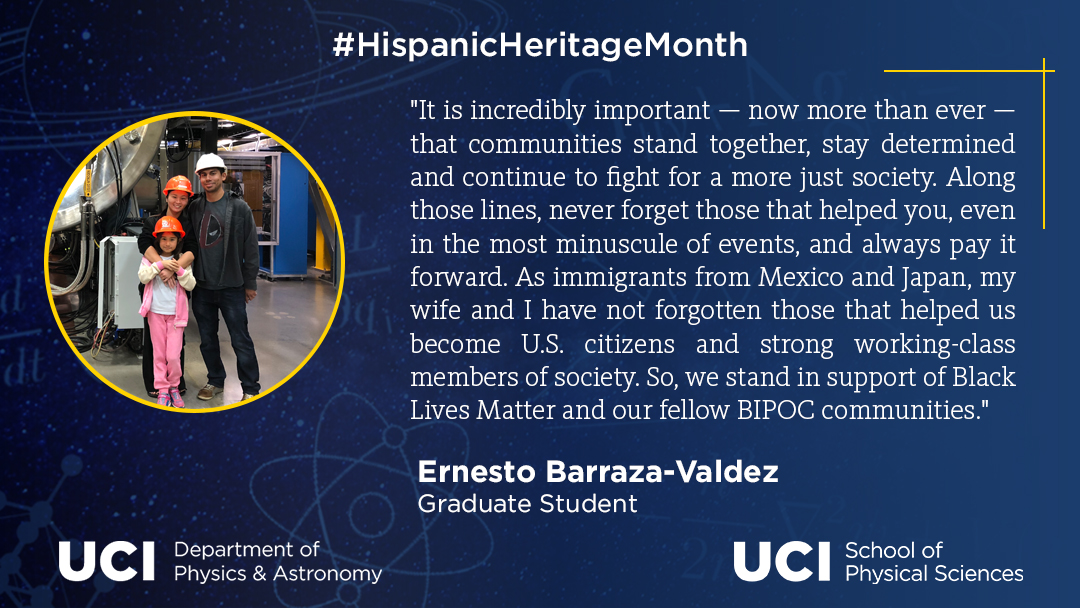
PS: Tell us about yourself and your research.
EBV: My name is Ernesto Barraza-Valdez, and currently I am a graduate student pursuing my Physics Ph.D. under Professor Toshiki Tajima.
I was born in Sonora, Mexico, but my family (my single mom with three boys) immigrated to Tucson, Arizona when I was around seven years old. By the time I was starting college, the 2008 financial crisis had affected my family, leaving us without a home like so many other Americans. While working multiple minimum wage jobs, my mother and I powered through our engineering degrees and graduated hand-in-hand from the University of Arizona as engineers at the end of 2014 (I graduated in Electrical Engineering and she in Mining Engineering).
After graduating with my B.S. in Electrical Engineering, I got married to my wife, Naomi (a Japanese immigrant) and went to work at two companies: Sigma Technologies International and TAE Technologies. As an R&D engineer at Sigma, I helped develop high energy density capacitors for electric vehicles. At TAE, I worked on one of the largest privately funded nuclear fusion experiments, and I helped develop the one of the largest (if not the largest) high speed cryogenic vacuum systems, which pumped out hydrogen at 1 million liters per second.
After five years in industry, I decided to go back to obtain my Ph.D. in physics. Under Professor Tajima, I am researching laser wakefield acceleration (LWFA) using carbon nanotubes and nano emitters. Additionally, I am studying properties of materials for heat and radiation resistance in extreme environments such as nuclear reactors and space applications. I am also leading the American Nuclear Society at UCI.
PS: What advice do you have for hispanic students who are considering a career in STEM?
EBV: Unfortunately, 2020 has proven to be far worse than the 2008 financial crisis. For many, especially in the BIPOC community, it’ll be extremely difficult to move forward. All I can really say is to not be afraid of having determination, ambition and ideals. It is incredibly important — now more than ever — that communities stand together, stay determined and continue to fight for a more just society. Along those lines, never forget those that helped you, even in the most minuscule of events, and always pay it forward. As immigrants from Mexico and Japan, my wife and I have not forgotten those that helped us become U.S. citizens and strong working-class members of society. So, we stand in support of Black Lives Matter and our fellow BIPOC communities.
Sandy Robles, Finance Assistant, Dean's Office
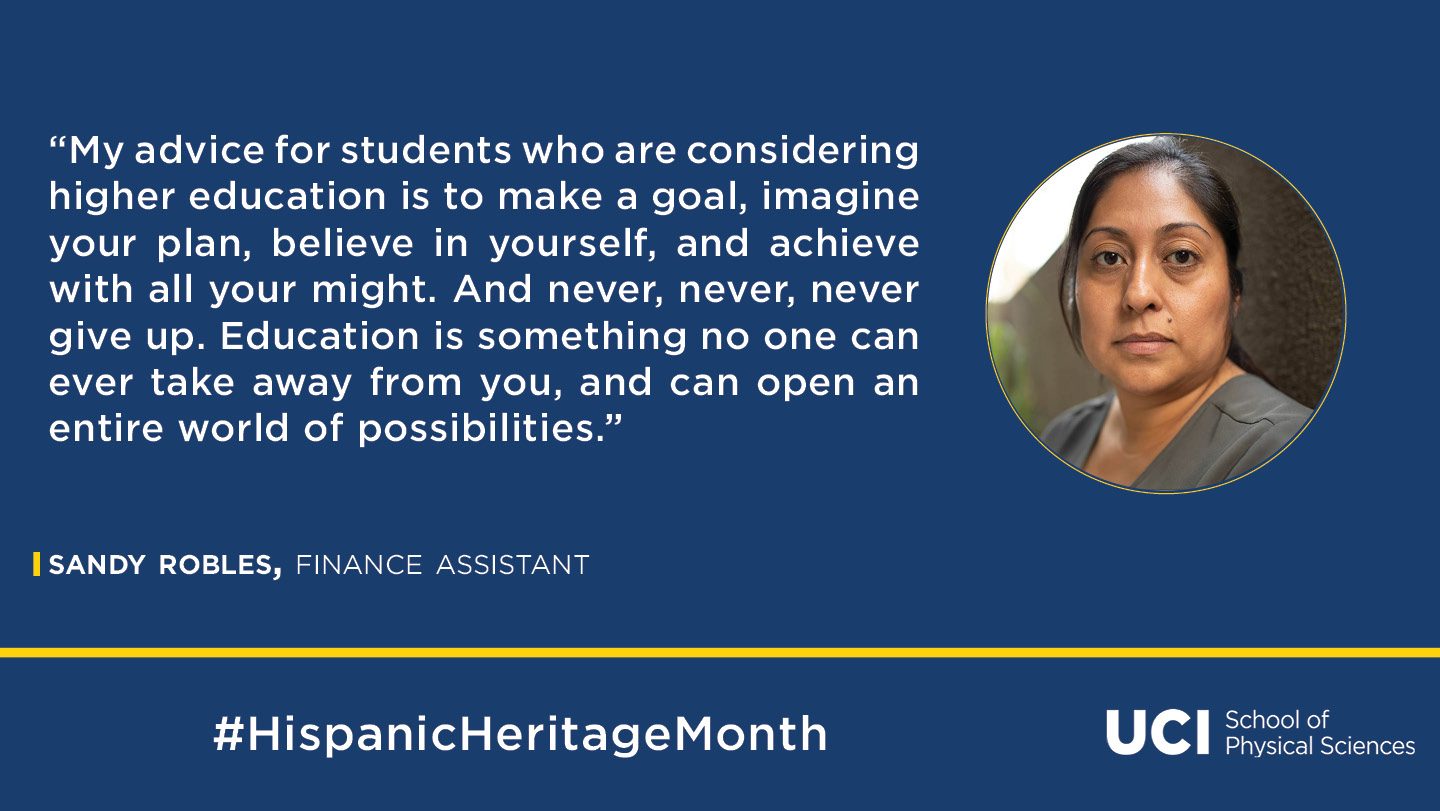
PS: Tell us about yourself and your research.
SR: I am the Finance Assistant in the Physical Sciences Dean's Office. I joined the School in February 2017. Before working at PS, I was at the UCI Central Cashiers office. One of my responsibilities nowadays is managing the billing for the School of Physical Sciences’ facilities, such as ass spectrometry, laser spectroscopy labs, glass shop — to name a few. I am a first-generation college student. After working for the bank industry for thirteen years, I decided to go back to school and finish my college degree. I graduated from UC Riverside in 2016.
PS: What advice do you have for hispanic students who are considering pursuing higher education?
SR: I am the product of my family's sacrifices. Before I was able to conquer my goals, I had to learn to overcome my fears. It is never too late to follow your dream. My advice for students who are considering higher education is to make a goal, imagine your plan, believe in yourself, and achieve with all your might. And never, never, never give up. Education is something no one can ever take away from you, and can open an entire world of possibilities.
German Enciso, Vice Chair for Graduate Studies, Department of Mathematics
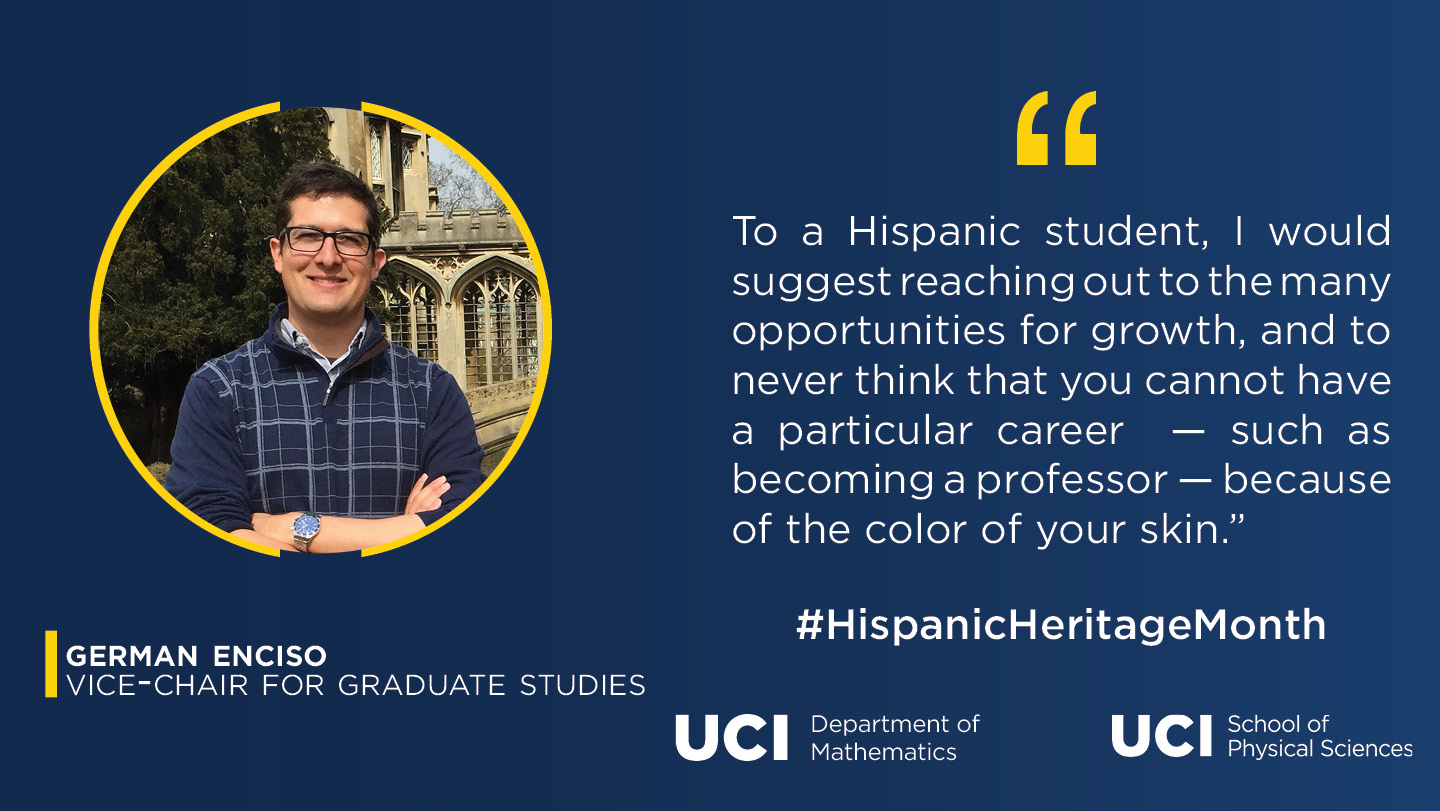
PS: Tell us about yourself and your research.
GE: I'm a faculty member in the department, and I also act as department Vice Chair for Graduate Studies. In this regard, I interact often with students and oversee multiple different graduate student activities. I also run the admissions season and new student orientations. My research is in Mathematical Biology, and I work closely with experimental biologists to model and describe their experiments. I also create new mathematical results based on problems from cell and systems biology.
PS: What advice do you have for hispanic students who are considering a career in STEM?
GE: I come originally from Colombia, and although I didn't grow up in the Hispanic communities in the U.S., I identify with the Hispanic culture and its values. To a Hispanic student, I would suggest reaching out to the many opportunities for growth (SACNAS, NSF graduate fellowships), and to never think that you cannot have a particular career — such as becoming a professor — because of the color of your skin.
Bob Pelayo, Assistant Professor of Teaching, Department of Mathematics
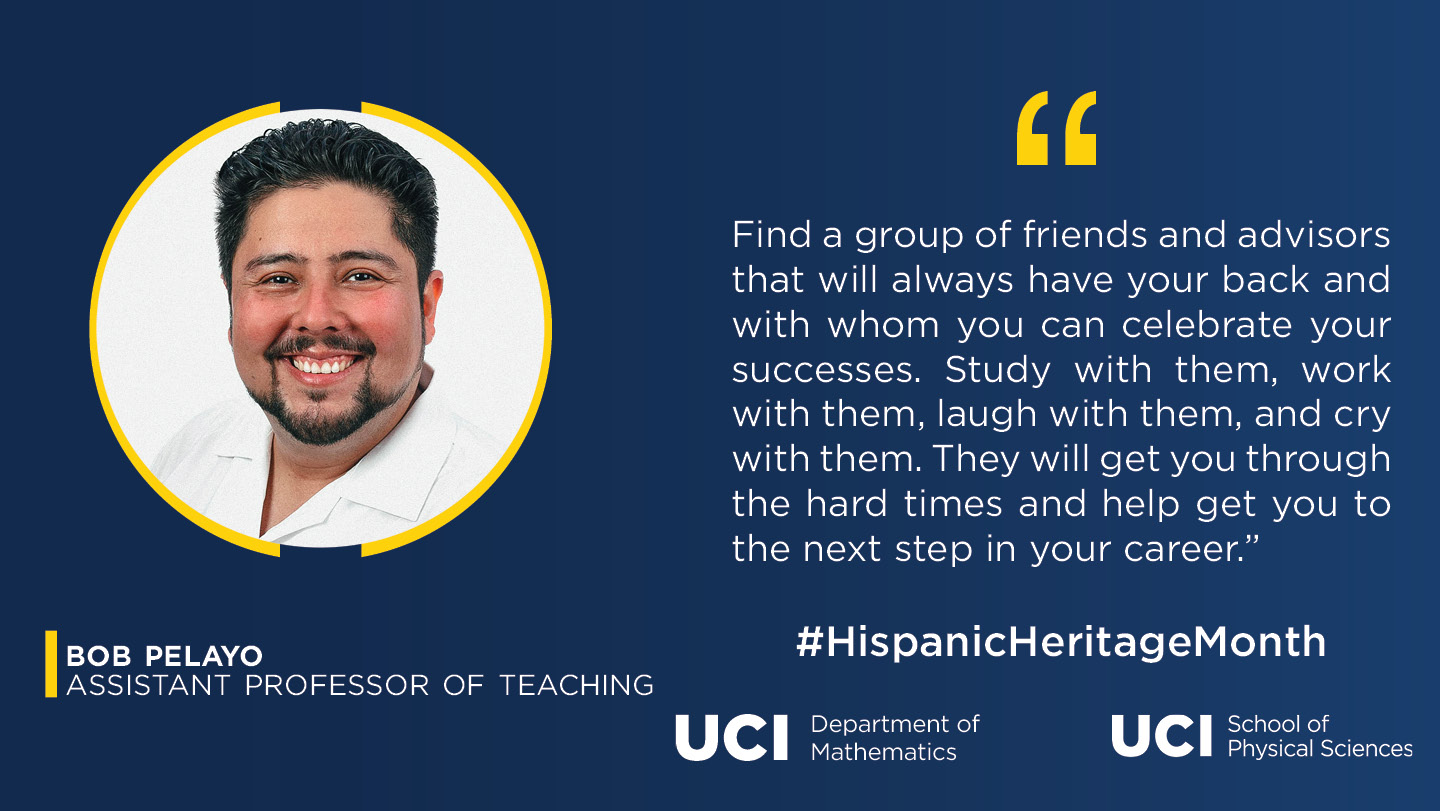
PS: Tell us about yourself and your research.
BP: I am teaching faculty at UC Irvine. In that capacity, I work to ensure that undergraduate and graduate students are getting the best educational experience they can while in the UCI math department. I am also the Data Science concentration advisor. My education research interests include data science pedagogy and mathematics program assessment.
PS: What advice do you have for hispanic students who are considering a career in STEM?
BP: Find your community and take pride in your accomplishments. Find a group of friends and advisors that will always have your back and with whom you can celebrate your successes. Study with them, work with them, laugh with them, and cry with them. They will get you through the hard times and help get you to the next step in your career.
Leticia Fernandez, Undergraduate Student, Department of Mathematics
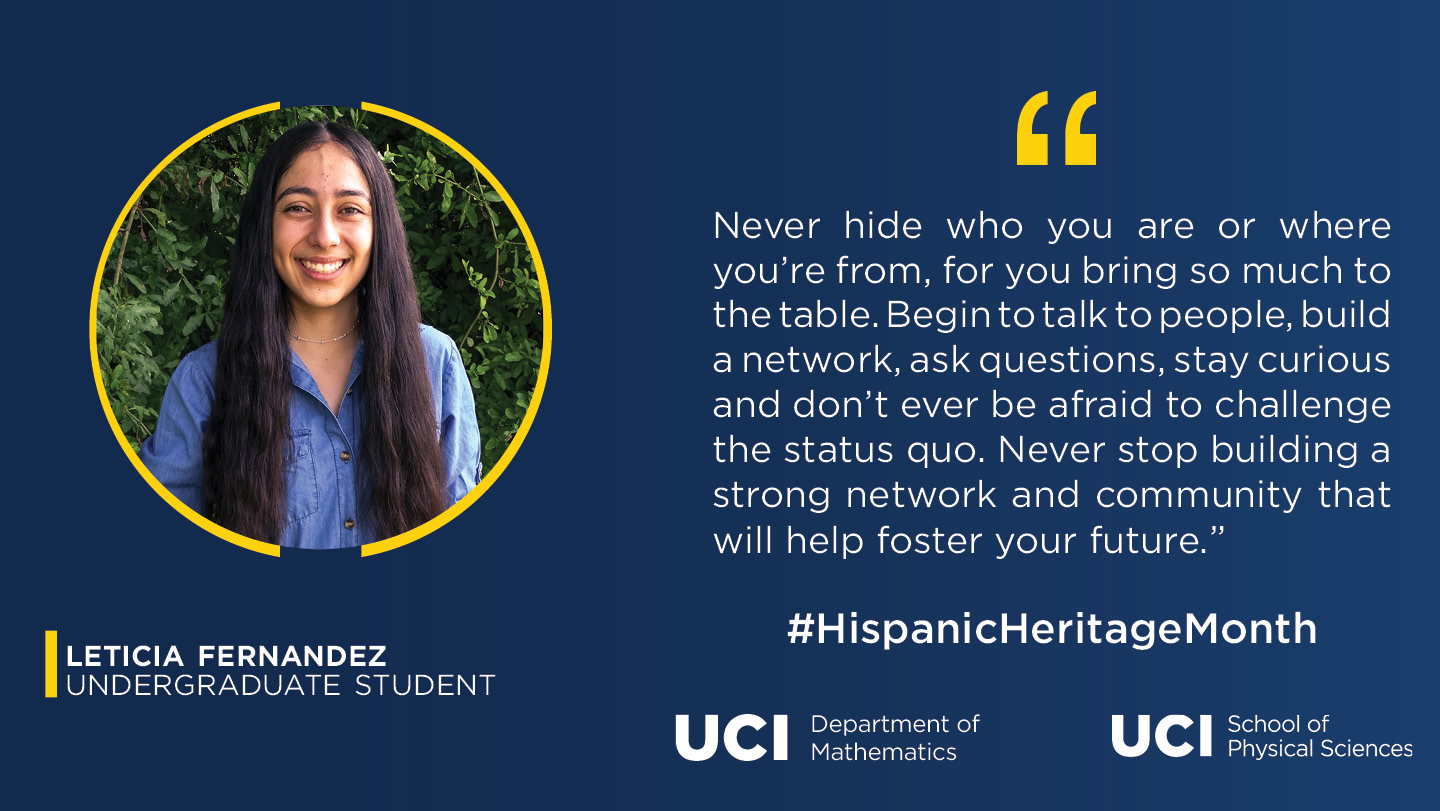
PS: Tell us about yourself and your research.
LF: My name is Leticia Fernández and I’m a first-generation Mexican-American. I’m an incoming third-year undergraduate student double majoring in Mathematics and Spanish, currently interested in Sports Data Analysis and STEM Outreach in underrepresented communities. I’m very passionate about advocating for women pursuing a career in STEM, specifically mathematics, raising awareness of and working to bridge the racial gap in STEM education, and improving representation for minority students throughout the STEM academic landscape
In the math department I serve as the Executive Director for UCI Math CEO, a program designed to engage middle school students in future STEM careers. the founder of Faces In Mathematics, which has the goal of creating a community and providing impactful opportunities and support for underrepresented students in the mathematics department.
Aside from this, I’m the Executive Director of the AAUW Ontario-Upland-Rancho Tech Trek Alumni Chapter, where we encourage young girls to build an interest in STEM. I also play on the UCI Women’s Club Soccer team, I serve as the Director of Professional Development for Rotaract UCI, and I love to explore the outdoors in my free time.
PS: What advice do you have for hispanic students who are considering a career in STEM?
LF: Never hide who you are or where you’re from, for you bring so much to the table. Begin to talk to people, build a network, ask questions, stay curious and don’t ever be afraid to challenge the status quo. Never stop building a strong network and community that will help foster your future. ¡Como la raza que somos hay que ponernos las pilas y aprender a reconocer que nosotros también podemos!
John Peca-Medlin, Ph.D. Student, Department of Mathematics
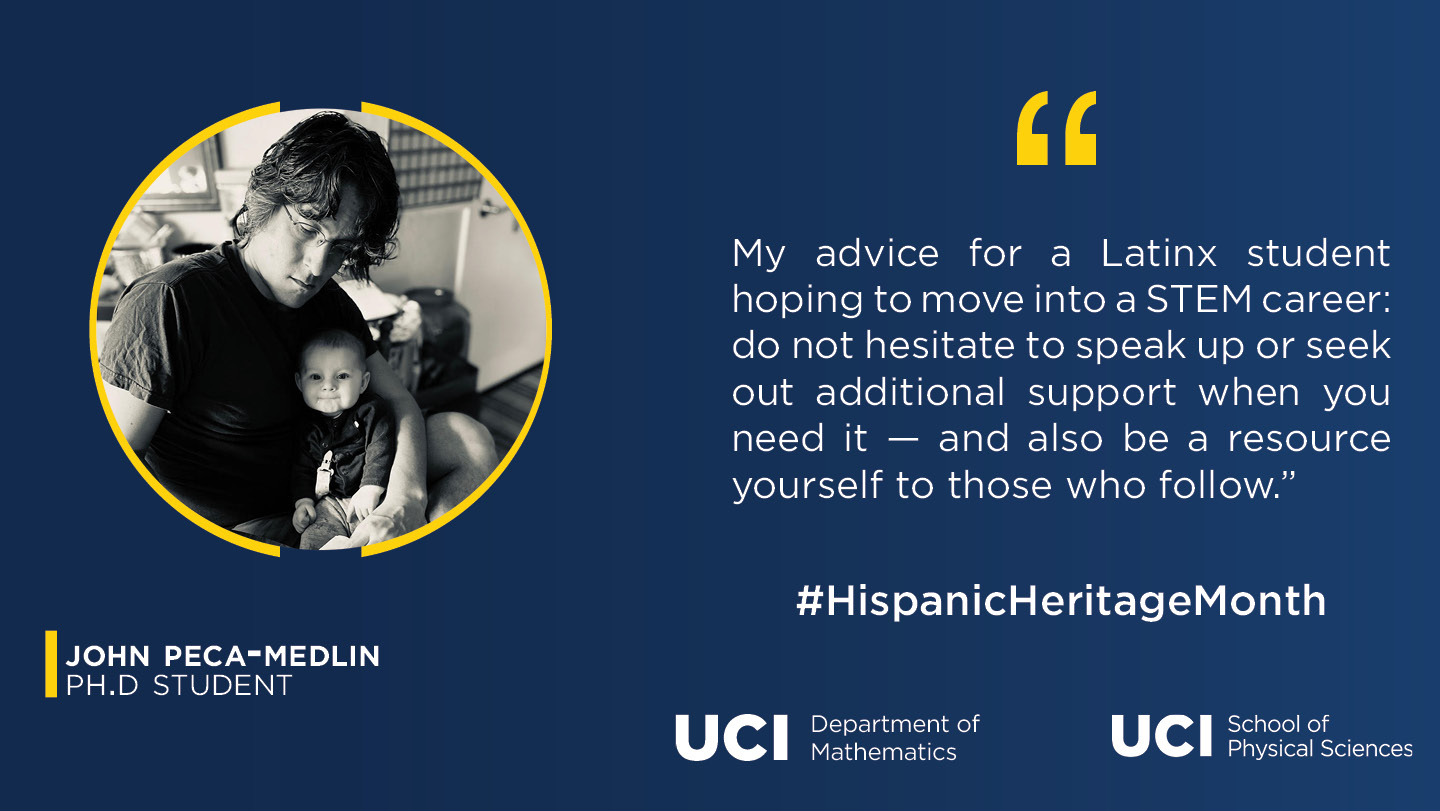
PS: Tell us about yourself and your research.
JPM: I’m a sixth year in the Ph.D. program in Mathematics here at UCI. My advisors are Mike Cranston and Tom Trogdon (now at the University of Washington). My research interests fall under the umbrella of Random Matrix Theory, which studies the spectral, numerical and group properties of matrices whose entries are random variables. Currently, I’m working with a particular ensemble of recursively defined random matrices, which can be used to accelerate common methods in computational linear algebra, and have recently gained traction particularly in convolutional neural network architectures for image processing. I also am studying how random matrices can be used to model real world systems, such as ocean waves, along with other wider-ranging results in random graph theory and number theory.
Also, this year I’ll be the inaugural Community Outreach and Mentoring Program (COMP) Fellow for the math department. This program grew out of student feedback gathered by our department during the spring and summer, at the height of isolation caused by the current pandemic. We plan to build a stronger mathematical community at UCI through organized social events and weekly discussions on topics ranging from student health and well-being to broader social issues that affect the mathematical community and beyond.
Outside of math, I enjoy running with my dogs, watching movies, playing trivia, and spending as much time as possible with my wife and two sons.
PS: What advice do you have for hispanic students who are considering a career in STEM?
JPM: It’s a little challenging to provide advice due to the diversity of people who identify under the Latinx label. That said, we have in common that in STEM, and in academia at large — but in mathematics in particular — Latinx voices are seldom able to speak as loudly as others. A lot of this is due to systemic barriers that result in smaller representation in faculty and staff, which then propagates lower representation in future generations of students. Some institutions acknowledge this issue and offer additional support systems. Other places do not acknowledge that these barriers exist at all. My advice for a Latinx student hoping to move into a STEM career: do not hesitate to speak up or seek out additional support when you need it — and also be a resource yourself to those who follow.
Paul Hurst, Graduate Student, Department of Chemistry
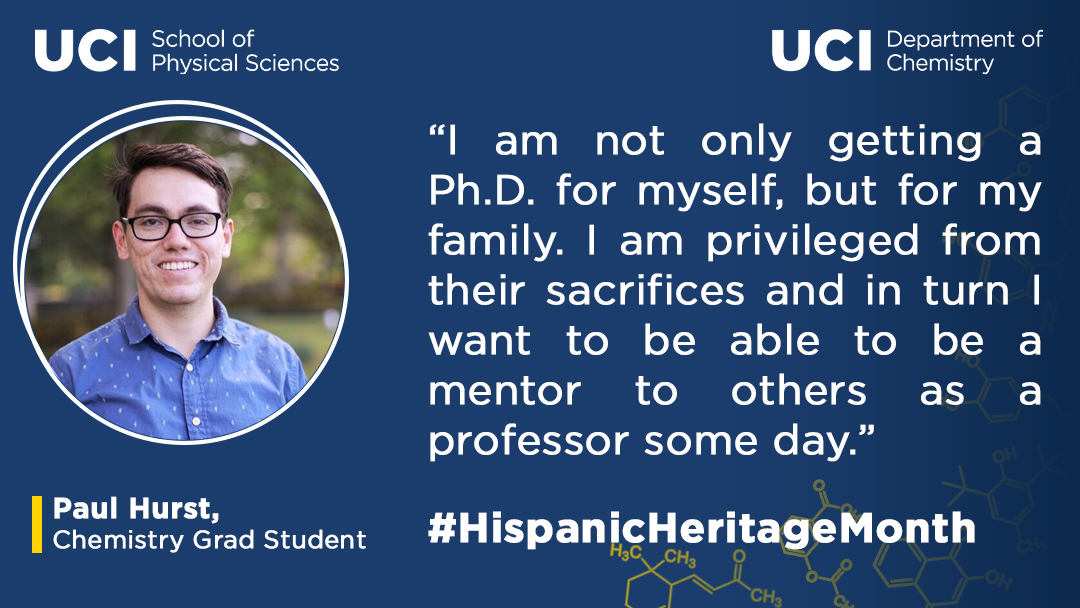
PS: Tell us about yourself and your research.
PH: I am in Joe Patterson's lab (end of 2nd, start of 3rd year student). My research is focused on developing and understanding the polymer formation I recently had the opportunity to participate in the LatinXChem Twitter conference. Check it out.
PS: What advice do you have for hispanic students who are considering a career in STEM?
PH: My mother left her native Peru to come to the United States to pursue a higher education. She along with my abuelo and abuela taught me the value of hard work and education through their examples. They didn't have access to the opportunities I have, so I am not only getting a Ph.D. for myself, but for my family. I am privileged from their sacrifices and in turn I want to be able to be a mentor to others as a professor some day.
Jonathan Galicia, Undergraduate Student, Department of Chemistry
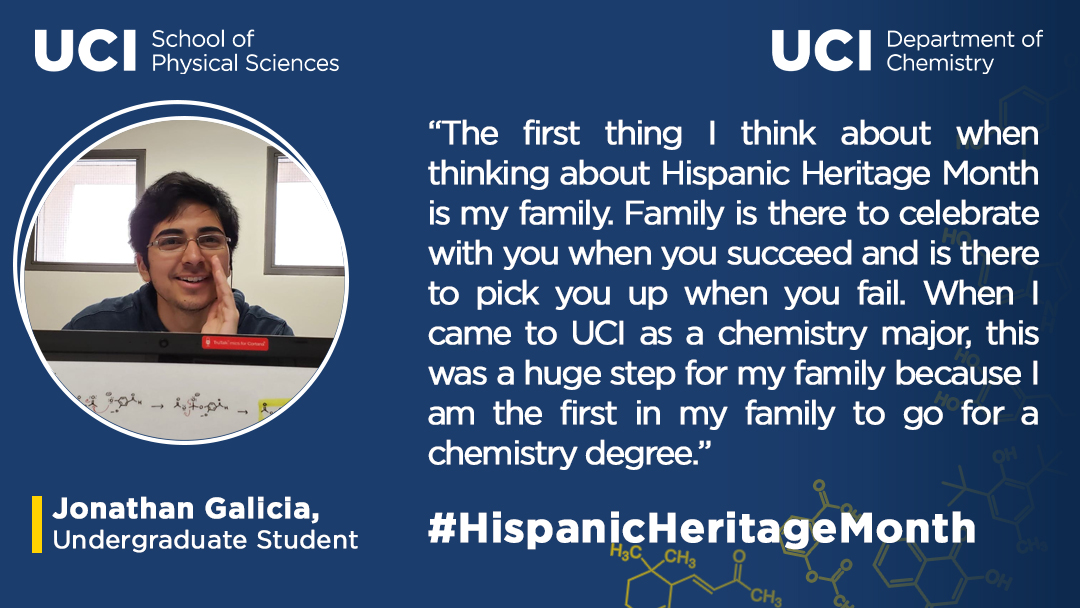
PS: Tell us about yourself and your research.
JG: I'm in Dr. Yang's lab and I'm a senior, class of 2021.
PS: What advice do you have for hispanic students who are considering a career in STEM?
JG: The first thing I think about when thinking about Hispanic Heritage Month is my family. Family is there to celebrate with you when you succeed and is there to pick you up when you fail. When I came to UCI as a chemistry major, this was a huge step for my family because I am the first in my family to go for a chemistry degree. Being an underrepresented minority in chemistry allows me to represent not only my family but also my community.
Mariana Navarro, Graduate Student, Department of Chemistry
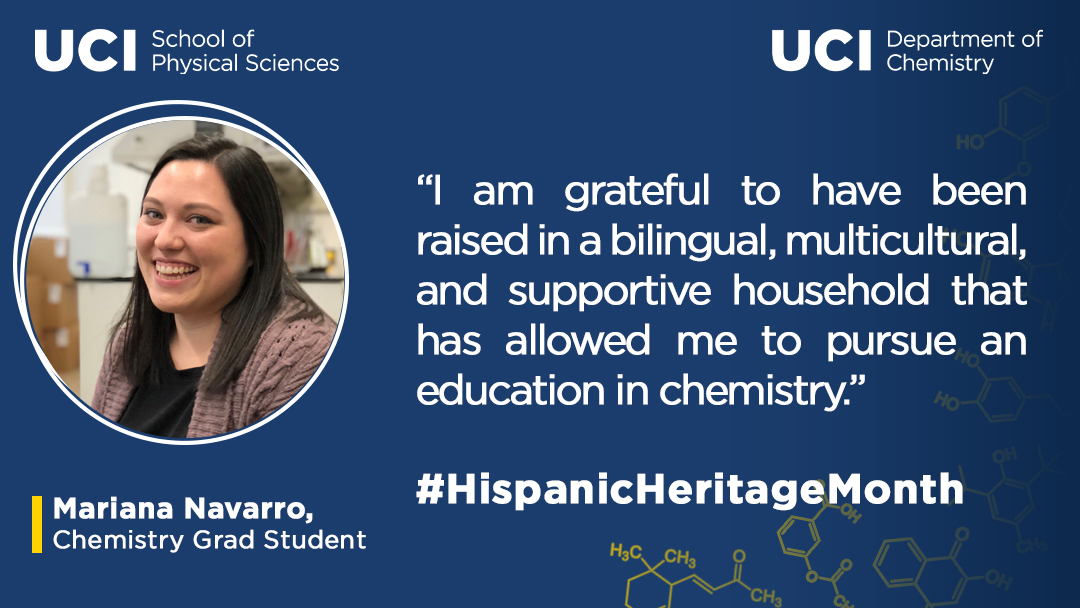
PS: Tell us about yourself and your research.
MN: I am a rising third year student in the Prescher Lab.
PS: What advice do you have for hispanic students who are considering a career in STEM?
MN: To me, celebrating my Hispanic heritage means embracing the cultures and traditions of being Mexican-American while acknowledging the obstacles that my family and I have faced. I am grateful to have been raised in a bilingual, multicultural, and supportive household that has allowed me to pursue an education in chemistry. Throughout my career, I hope to motivate others to embrace and actively encourage diversity in STEM.
Jennifer Campos Ayala, Ph.D. Student, Department of Chemistry
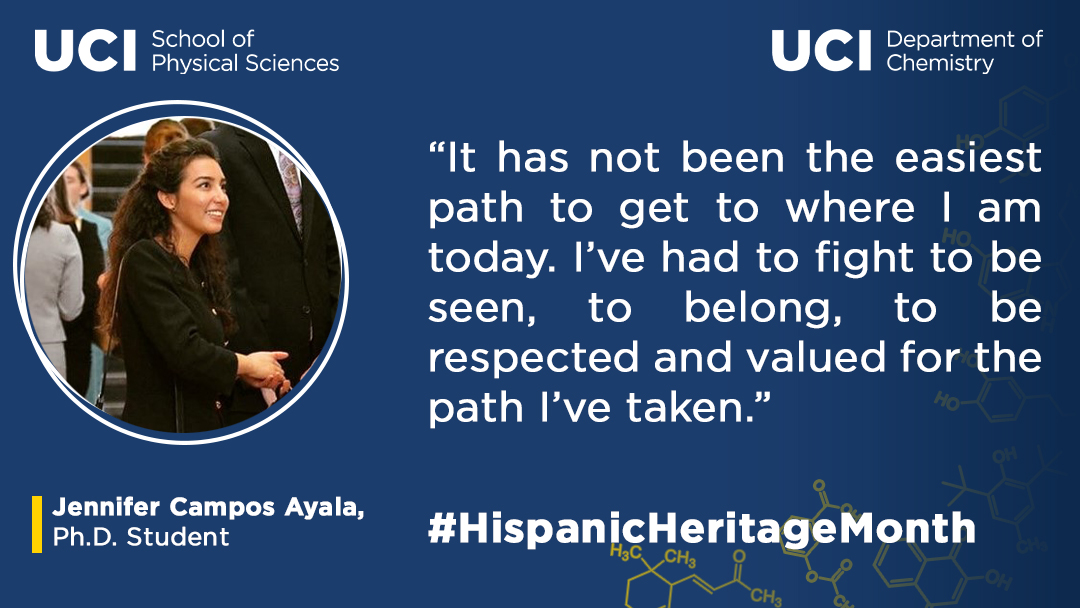
PS: Tell us about yourself and your research.
JCA: I’m a second-year in the Saltzman-Aydin lab where I’m working on recreating Earth’s fire history, which will provide insight into the relationship between fire and climate.
PS: What advice do you have for hispanic students who are considering a career in STEM?
JCA: Raised by immigrant parents, I knew seeking higher education was something I would have to figure out on my own, and it has not been the easiest path to get to where I am today. I’ve had to fight to be seen, to belong, to be respected and valued for the path I’ve taken. I’m driven by viewing my involvement in the STEM field as an opportunity to represent my culture and upbringing while also clearing obstacles and encouraging younger URM generations in STEM. Though it has been a challenging and lonely journey at times, I look forward to the day when I can work in a field as diverse as the neighborhood I grew up in.
